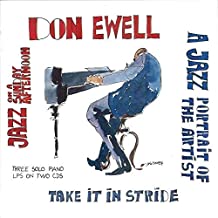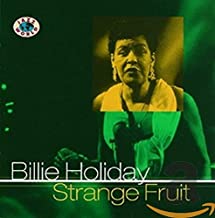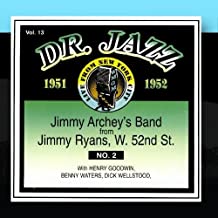
Daily Dose Of Jazz…
Paul D. “Polo” Barnes was born on November 22, 1901 in New Orleans, Louisiana, the brother of Emile Barnes. He attended St. Paul Lutheran College and began playing alto saxophone in 1919. He and Lawrence Marrero formed the Original Diamond Band, later known as the Young Tuxedo Band.
In 1922 he was with Kid Rena, then the Maple Leaf Orchestra in 1923, and Papa Celestin’s Original Tuxedo Band. Later that year; Celestin’s group recorded his composition My Josephine, which became quite popular. He went on to play with Chick Webb in 1927 and with King Oliver three times between 1927 and 1935. He toured with Jelly Roll Morton in 1928-29.
In 1932-33 he led his own band then through that decade he played with Chester Zardis and Kid Howard. He played in Algiers, Louisiana in a Navy band during World War II, then returned to work with Celestin from 1946 to 1951. The Fifties saw him moving to California and left music, however, upon his return to New Orleans in 1959, he played with Paul Barbarin in 1960. but from 1962-65 joined the Young Men from New Orleans band that played on a riverboat at Disneyland.
Returning once again to New Orleans in 1964 he played at Preservation Hall and Dixieland Hall. While touring Europe in 1973-74, poor health ended his career in 1977. Clarinetist and saxophonist Polo Barnes, a mainstay of the New Orleans jazz scene of the 1920s and 1930s, passed away on April 3, 1981 in his hometown.
More Posts: clarinet,hitory,instrumental,jazz,music,saxophone

Daily Dose Of Jazz…
Achille Joseph Baquet was born on November 15, 1885 in New Orleans, Louisiana into a musical family whose patriarch, Théogène, led the Excelsior Brass Band. He learned the clarinet from Luis “Papa” Tio and was thought to have been a member of the Whiteway Jazz Band.
Moving to New York City in 1918, then ragtime pianist, vocalist, and leader Jimmy Durante, the only member not from New Orleans, hired him to play with the Original Dixieland Jazz Band that was founded by Johnny Stein. He would go on to work with Papa Jack Laine’s Reliance Brass Band and was part of the clarinet section of the Happy Schilling Dance Orchestra.
Baquet’s credits as a composer include Why Cry Blues, written with Jimmy Durante. According to Papa Jack Laine, he co-wrote Livery Stable Blues with Acide “Yellow” Nunez.
Clarinetist and saxophonist Achille Baquet, who was a light-skinned black man able to pass for white, passed away on November 20, 1956 in his hometown.
More Posts: clarinet,history,instrumental,jazz,music,saxophone

Daily Dose Of Jazz…
Donald Tyson Ewell was born in Baltimore, Maryland on November 14, 1916. He played with Bill Reinhardt’s Jazz, Ltd. band in Chicago, Illinois in 1947, 1948, and 1949. From 1956 to 1962, he was a member of the Jack Teagarden band and after Teagarden’s death, he went on tour in Europe.
Returning to New Orleans, Louisiana he performed in clubs and hotels. From 1976 to 1978 he performed in concert while battling alcoholism, he lived with his friend King Denton, the manager of a jazz club where Don was Artist in Residence.
He worked with Sidney Bechet, Kid Ory, George Lewis, George Brunis, Muggsy Spanier, and Bunk Johnson. He recorded twenty-one albums as a leader and seven as a sideman with Barbara Dane, Doc Evans, Bunk Johnson, Jack Teagarden. Moving back to Maryland. After his daughter’s death from cancer and after two strokes, stride pianist Don Ewell passed away on August 9, 1983.
More Posts: bandleader,history,instrumental,jazz,music,piano

Daily Dose Of Jazz…
Sonny White was born Ellerton Oswald White on November 11, 1917 in Panama City, Panama. He took the nickname Sonny while a member of Jesse Stone’s band in the middle of the 1930s. Later in the decade, he played with Willie Bryant, Sidney Bechet, Frankie Newton, and Teddy Hill alongside Dizzy Gillespie and Kenny Clarke.
He recorded several sessions with Billie Holiday, with whom he had a yearlong affair in 1939, and their engagement was announced in Melody Maker that May. A member of different line-ups backing Holiday in New York between January 1939 and October 1940, Sonny performed on the classic recording of Strange Fruit.
The 1940s saw him spending time in the bands of Artie Shaw, Benny Carter, with whom he played before and after his World War II military service. He would play again with Carter, Dizzy Gillespie, Big Joe Turner, Lena Horne, Dexter Gordon from 1944 to 1946, and Hot Lips Page in 1947.
In the 1950s he played with Harvey Davis and then with Wilbur De Paris, remaining with the latter until 1964. In the 1960s he freelanced with Eddie Barefield, among others, and was working with Jonah Jones at the time of his death. Pianist Sonny White passed away on April 28, 1971 in New York City.
More Posts: history,instrumental,jazz,music,piano

Daily Dose Of Jazz…
Jimmy Archey was born on October 12, 1902 in Norfolk, Virginia. He began playing when he was twelve and was getting professional gigs a year later. He studied at Hampton Institute from 1915 to 1919, played in Atlantic City, New Jersey for a while before moving to New York City in 1923.
During the Roaring Twenties, he played with Edgar Hayes, Most noteworthy for his work was in several prominent jazz orchestras and big bands of his time, including leading one of his own. He performed and recorded with the James P. Johnson Orchestra, King Oliver, Fats Waller, and the Luis Russell Orchestra, among others.
The late 1930s saw Archey participating in big bands that simultaneously featured musicians such as Benny Carter, Coleman Hawkins, Cab Calloway, Duke Ellington, and Claude Hopkins. In the 1940s he toured France with Mezz Mezzrow and in the 1950s, he spent much of his time working with New Orleans revivalist bands with artists such as Bob Wilber and Earl Hines.
Becoming a bandleader, during the next few years, he headed a sextet, which in 1952 had trumpeter Henry Goodwin, Benny Waters on clarinet and pianist Dick Wellstood. A major yet underrated musician, his only sessions recorded as a leader were for Nec Plus Ultra, the French Barclay and the 77 label. Trombonist Jimmy Archey passed away on November 16, 1967 in Amityville, New York.
More Posts: bandleader,history,instrumental,jazz,music,trombone



